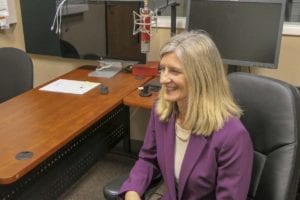It’s the first time in years that the district has returned all three incumbents
CLARK COUNTY — The 2019 version of the Washington State Legislature kicked off this week. Odd numbered years are longer sessions, meaning lawmakers will have 105 days. The shorter 2018 legislative session went into two overtimes before a deal could be reached that would ultimately satisfy the long-running McCleary Education Funding verdict by the state Supreme Court.
In gearing up to cover the legislative session, ClarkCountyToday.com checked in with the delegation from Clark County, either directly, or by attending town hall meetings.
You can see our coverage of the 18th District’s plans and objectives for the session here:
18th District legislators touring ahead of 2019 session

The lawmakers from the 17th District didn’t hold any group town hall meetings ahead of the session, but we caught up with each one individually to ask what they’re working on this session.

It is, perhaps, a remarkable commentary on the 17th District that, entering his fifth term in the state House, this will be the first time Paul Harris has had an incumbent elected in his district’s other seat. Vicki Kraft narrowly defeated Tanisha Harris to hold on to Position 1 in the 17th District, which has a tendency to swing back and forth.
Despite that, Harris has managed to hang on, perhaps owing to his ability to work across the aisle with Democrats, and find compromise where other Republicans might refuse to budge.
“I don’t ever rant and rave against my Democrats and what they do, because I’m going to come back and work with them tomorrow on a bill we both agree on,” Harris says, “and I don’t want to destroy that relationship.”
Education funding
That relationship saw the 65-year old Republican as one of the group tasked with addressing the state’s basic education funding crisis. Of the likelihood that districts facing budget shortfalls under the McCleary funding fix, Harris blames Democrats who, he says, removed a safeguard on the new money, allowing teacher unions to negotiate for all of the money up front.
“They’ve negotiated salaries that were never intended to go that high,” Harris says.
That situation has now led to calls from Gov. Jay Inslee and State Schools Superintendent Chris Reykdal to allow some districts to raise their local levies higher than the cap passed by the legislature last year. That levy swap was a compromise as state property taxes were raised to provide an additional $4 billion in education funding, bringing the state’s annual cost for basic education to just over $8 billion.
Harris says he finds the idea of so quickly eliminating local levy caps “a little scary,” and that, if the legislature is going to look at adjustments to McCleary this soon, it might be well served to examine stricter rules on how districts can spend the money they raise through enrichment levies, and better define what a teacher’s standard workday should look like.
“We cannot have unlimited enrichment,” he says. “I really want to take a look at this, because what becomes enrichment today might become basic education tomorrow.”
Harris said he anticipates the Democrats, who have a heavy majority in both houses, will likely want to look at making changes. But with other pressing matters at hand, it’s not likely any sweeping modifications are in order.

On the senate side, Sen. Lynda Wilson says she expects to hear from local districts about the situation they’re in. “I expect they’re going to come and ask, no doubt,” she says.
Wilson is entering her second term in the senate after spending two years in the house. The 59-year old was gearing up for the session in-between chemotherapy appointments for a breast cancer diagnosis. But she says she’s nearing the end of those treatments and eager to get back to work. Just, maybe not on the education funding issue.
“They negotiated away dollars that I don’t think they should have been negotiating,” Wilson says of districts. “And I think that it’s going to be tight for them and they are going to have to look at cuts.”
One area of education sure to get a close look is special education. Harris says some small fixes were put in place last year, but the state knew more work would be needed in this session.
“We have a safety net in special education that I think we’ve made it too difficult to get to,” Harris says, adding that he’s hoping to “allocate more on a percentage basis, and we’ll look at special education just in general and probably do a soft fix to that. But we’ll make those special dollars available easier to those districts.”
Mental health treatment
One area both sides agree needs major work this session is the state’s mental health crisis. With Western States Hospital losing $50 million in state funding due to ongoing issues, the governor has proposed regional mental health treatment centers, with the aim of keeping people going through treatment closer to friends and family.
Harris, who has said mental health treatment is among his top priorities this session, agrees with the idea of more localized mental health treatment, but disagrees with the governor’s idea of having the state run them.
“The state has not shown to me that they can run state-run hospitals,” Harris says, “let alone even smaller similar hospitals.”
Harris said he believes the state should assist with funding, and overseeing the hospitals, but should seek private companies to run them.
State healthcare option
The governor also made headlines last week, announcing that he was proposing a state-run single payer healthcare option.
Harris has said he prefers looking into increasing medicare reimbursements as a method to bring down healthcare costs for some, and incentivizing more doctors to take low income patients. But, he says, he’s not in favor of a single payer option run by the state.
“Who’s going to pay for it, and how’s it going to function?” he says, outlining some of the concerns he has about the idea.
Wilson calls ideas like those in the governor’s budget “pie in the sky.”
“I mean the capital gains income tax that he’s wanting isn’t even constitutional,” she says. “You have a governor’s budget that is more than double what’s come in, and he’s planning to spend all of that, plus. And the only way we’re going to get to the ‘plus’ he’s looking for, and probably some of these other legislators are looking for, is taxation.”

Kraft says taxation, and the rising cost of living in the state, was one of the top complaints she heard while campaigning last year.
“People are literally having to move out of their homes, especially some of our elderly constituents, because of some of these realities,” she says.
“We’re going to have more money without raising taxes at this point,” says Harris. “The governor’s had a 20 percent increase, while we’re experiencing about a 10 or 12 percent increase.”
While there have been calls for reform to the state’s tax system, which has been labeled among the most regressive in the nation, Harris says it’s at least working in the sense of bringing money into the state’s coffers.
“It’s producing great revenues throughout our state compared with those around us who have raised their taxes,” Harris says. “We just need to actually curtail our spending some. We can still spend more, but we just can’t spend 20 percent more.”
With property taxes already hitting many homeowners hard, Wilson fears the next target will be the state’s businesses.
“I do not agree with the capital gains income tax, and the fact that the governor, in his budget, is increasing the B&O tax on small businesses,” she says. “In fact, I would like to encourage the reduction of the manufacturing sector B&O tax, down to at least equal to what Boeing has.”
“I may want to go to the nicest restaurant in town but, if my budget doesn’t allow it, I’m gonna go to Applebee’s or maybe McDonalds, depending on what my budget allows,” says Kraft. “Ultimately I still get food. Ultimately I still get what I need. And that’s the very same approach that we need to take in state government.”
Transportation funding
With conversation recently heating up over possibly rebooting plans to replace the aging Interstate 5 Bridge, transportation funding is sure to be a hot topic in this session.
In his budget, Gov. Inslee has said he at least wants funding to restart the planning process for a new bridge. But he also sided with Oregon’s governor, saying the inclusion of Light Rail would be a requirement in order for him to support the project.
“It’s going to take some strategy, I guess, to move through what needs to happen and what we all can agree on,” says Wilson, who was among a group of Southwest Washington lawmakers to send a letter to the governor in the weeks before the session, urging him to consider alternative forms of mass transit for the bridge.
Harris, who was named chair of the state Republican caucus, will have a strong say in what comes of the Interstate 5 Bridge project. With the ability to assign members to the bi-state Interstate Bridge commission, formed in the last legislative session. Harris said he hopes things can move ahead.
“I do agree that we need multiple crossings. I just believe that the I-5 Bridge is the one that Oregon agrees with us right now on, and we want to start this relationship in a good way,” he says. “This bridge commission will look at multiple crossings, and start planning in the future for other crossings.”
Wilson says their meetings with Oregon lawmakers have encouraged them to feel that something could get done sooner, rather than much, much later.
“They keep telling us that we need to be serious about this,” she says. “Well, in the last three years we have been serious. We passed a bill, it was bipartisan, it was strongly supported in both houses.”
Kraft diverted somewhat from her colleagues, writing her own letter to the governor, urging him to listen to Southwest Washington voters who spoke out strongly against the inclusion of Light Rail in the Columbia River Crossing project.
“There will be a transportation package, very likely, and it will include taxes,” Kraft says. “Potentially carbon taxes, potentially a fuel tax. There’s some real revenue generating discussions going on around transportation.”
The state is also working on moving ahead with a widening project along SR-14 east of 164th into the Camas area, and all three lawmakers said they are planning once again try to move up funding for the 179th Street/I-5 Interchange project.
“We have a responsibility to be real about the solution we provide to them,” Kraft says, “and real about making sure that we are helping our citizens be able to get to work and back home with their families as quickly as possible.”
Other goals
Aside from those items, Harris is planning to reintroduce a bill to raise the state’s minimum age to purchase tobacco products to 21. The bill received bipartisan support in the last session, but failed to get to a final vote.
“I’ll be quite frank, it’s supported more by the Democrats than the majority of my caucus,” Harris says.
The Tobacco 21 bill, Harris says, came from what he’s been hearing from high schools around the state about problems with kids using vaping devices on campus, sometimes even in the classroom.
“We have too many kids that are vaping,” he says. “The latest research is staggering on what’s going on in our high schools with vaping products.”
Harris says similar legislation passed in other states has led to a steep decline in teenage use of tobacco and marijuana products, though he knows it’s not a cure-all for the problem.
Wilson says she will be focusing some of her energy on reintroducing legislation to allow community and technical colleges in the state to have on campus armed security.
“Last year it didn’t even get a hearing, and so this year I’m working with colleges to see if we can come up with something that works for them,” she says.
All of the 17th District legislators admit that, given the minority they’re facing, it will be difficult to stop some of the goals set by their Democratic colleagues this year. But Harris says, at the end of the day, nearly every lawmaker is trying to make the state a better place for their constituents.
“Not everything is divisive,” he says.




